- Home
- Belva Plain
Fortune's Hand Page 8
Fortune's Hand Read online
Page 8
When she stirred and moved her hand, light also moved, striking a fiery spark from the ring on her finger. A foolish piece of ancient mineral it was, of no real value except as a symbol. But as a symbol, it had no price. It was his pledge.
“Take the smaller one,” Eddy had urged. “She’ll appreciate quality, not size. Even if you could afford a big one, it would be too flashy for her. It’s not her type. Not Wilson Grant’s, either,” he had added with his inevitable, knowing grin.
Yes, she was quality in every way. Walking with her, so tall and poised, with that air about her that caused men to look, his heart swelled. And he saw her again as he would always see her, coming toward him on her father’s arm with her short veil lifting in the breeze and white ribbons trailing from her white bouquet. His love! His own!
That first time, in this bed, he had kissed the hollow of her throat. He had had a feeling almost holy, a thankfulness for such incomparable joy, a yearning to be worthy of it, to be … Well, putting it too simply, a yearning to be good.
Never, never will I hurt her, he vowed now as she slept, nor cause her a moment’s pain, God help me. And if I have said that once before in my life, God forgive me.
For who is there who has never made a mistake?
* * *
In Marchfield Lily Webster saw her, too, noting with a woman’s eye that the gown was made of some sheer fabric, that the veil fell from a crown of stiffened lace, and that the bridal bouquet held rosebuds mingled with white iris. She had even taken a magnifying glass to the newspaper and so discovered the tiny diamond studs in the bride’s ears. There she stood, Mrs. Robb MacDaniel, with her arm linked to the arm of her husband, Mr. Robb MacDaniel.
“Well, now that you’ve seen it,” said Lily’s mother, “why don’t you throw it away? You’re much better off without the nasty thing.”
Undoubtedly that was true; nevertheless it stayed hidden beneath odds and ends in a bureau drawer, along with the notice in the local paper of Robb’s honors at the law school commencement ceremonies.
So far, after six long months, Lily had found no truth in the old bromide about time’s healing power. Time did not heal; it merely covered over. The festering, bitter agony remained intact. The trick was of course not to show it.
Those first few days were the hardest, the first day at work perhaps the hardest of all.
“I saw a nice car in front of your house the other day,” said the neighbor as Lily went down the steps. “And I took a guess. Robb’s car. Right?”
“Yes, yes, it was.”
“Well, it won’t be long now, will it?”
Lily looked blank. “Oh yes … I mean no … Excuse me, I’ve got to run. I’m late.” And she did, literally, run down the street.
Then at the library came the usual questions.
“Have you and Robb decided where you’re going to live?”
“No, not yet.”
“Well, it’s a big decision, isn’t it? People want to get settled and stay for good.”
There seemed to be no end to these trite, well-meant remarks. No end, until finally she confided the truth to one of the old librarians. There were only four in the building, but this one had a keen understanding; she would spread Lily’s news with tact. And so she had.
Now there were no more questions. Instead there was a noticeable cheerfulness and gentleness in people’s manner. News had spread through the little town, at least among those whom Lily was likely to encounter. When the young widow on the next street invited her to a movie on Saturday night she was grateful, to be sure, but she was also well aware of being talked about. Robb’s defection made alluring entertainment.
Young men called and took her to the places where young people went: again to the movies, to a roadhouse for beer and dancing, or to another town for more of the same. It was not the paucity of all this that pained her—she was, after all, a small town girl who expected nothing different and had been contented here—it was the fact that wherever they took her she had already been innumerable times with Robb. Each place, each bend in the road, had its memories of him; his face, laugh, voice, and loving arms.
And so, one day not long after he had appeared in the paper as a bridegroom, Lily took two steps. She destroyed the clipping. She told her mother that she was leaving Marchfield.
“You’re leaving me?” Mrs. Webster was shocked.
“Not leaving you so much as leaving my past. I need to wipe it away, if I can, and that’s impossible here.”
“I hope he’s miserable. I hope he never has a happy day.”
“Whether he does or not, Mother, has no affect on me. Every hour of my life he’s in my thoughts. I can’t seem to help it. I guess I never will.”
“Where are you going?”
“To Meredith. The library there is much larger than ours. It’s a county library. They have a place for me and the pay is better, too.”
“He spoiled your life.”
Yes. Yes, a thousand times over, Lily thought. A sparrow was building a nest beneath the overhang on the back porch; it must have made twenty trips in the last hour bearing twigs, scraps of the fall’s dead leaves, and even a piece of twine. It had a definite purpose and the energy to carry it out. While I have none, she thought; my purpose lies discarded with the rug, the kitchenware, and the satin for the wedding dress that was to have been mine. And she sat there on the step, sat quietly so as not to frighten the bird.
Mrs. Webster’s face had withered into sadness. Her daughter was wretched; her daughter was going away and leaving her forlorn.
“Don’t be so sad, Mother,” Lily comforted. “Meredith isn’t all that far away. We’ll both go back and forth.”
There was a long silence. Down on Main Street the great clock struck noon, leaving a vibration in the air. The day moved along. And after a while Mrs. Webster spoke again.
“I suppose we should look at the bright side.” It was one of her pleasanter qualities that, after gloom and grumbling, she could turn to the “bright side.”
“Is there any?”
“Yes, maybe you’ll meet a good man in Meredith.”
“Are there any?”
“Oh Lily, you do know better than that.”
“Do I? No, I don’t think so. I’m burned and I’m scarred and I’m afraid of fire. That’s how it is.”
CHAPTER SIX
1975
Julie Grant MacDaniel was born in May one month before her parents’ first anniversary. Her features were already delicate, and her black, scant hair gave evidence of future curls.
“She’s going to look like you,” Robb said.
He was struck with awe, tall with pride, and comically dazed at the same time. Ellen, relaxed upon the hospital’s pillows, was enjoying it all. Her setting was perfect, from the lace bed jacket to the flowers crowded on the window ledge, to the books and pink-wrapped baby gifts on every level surface in the room. This birth had, in a nice way, amused their friends. It was, after all, rather quaint to produce a child so promptly, while the frozen wedding cake was still edible. For goodness’ sake, one might think they had actually not known how to prevent it! But the truth was that they had not cared. Having at last been able to hold those long, intimate conversations in which a man and woman come to know each other, they had reached several decisions, among them to have four children. Ellen’s brother, Arthur, was a good deal older than she, so that their contact had been limited from the start, while Robb was an “only”; therefore, a large family was a priority.
Murmuring, he bent to kiss her. “I’m so proud of you. You can’t know. So proud.”
“Why? Because I’ve had a baby? Everybody has babies.”
“Not only that.”
“Then why else?” She liked to tease, so that he would say it again. “Because I’ve sold another set of illustrations?”
“Of course. I’m preparing to retire on your earnings. Oh, you know I love your book. But seriously, your father’s the one who’s really on cloud nin
e. Even the judge knows about the book. He wants to buy half a dozen copies for his relatives’ kids as soon as it’s in the stores.”
“I’m thinking of writing my own story next time, not just illustrating somebody else’s.”
“Your professor will be awfully upset to lose you.”
“But I have some great ideas. For instance, I’d like to have a dog-show theme. I already have the title: ‘Billy the Red Setter.’ The pictures could be charming.”
“How are you going to do all that now that we have Julie?”
“I don’t know, but I’ll manage.” Confidence, like an elixir, seemed to be passing through her veins. “I’ll work out a system. I’ll have to have one, won’t I, by the time number four arrives?”
He was standing there just looking at her. In his eyes she read a kind of wonder, an expression that sometimes made her think of a man who had been hungry and was now being presented with a feast. And very moved, she blurted something she had not intended to say.
“My father’s going to talk to you tomorrow when I get home. It’s supposed to be a surprise, but I can’t keep it in. When he tells you, don’t dare let on that you already know. Can’t you guess what it is?”
“Not at all.”
“Okay. Dad wants to take you into the firm. They’ve been needing somebody, and who’s a more likely choice than you? Ah, look at that smile—all over your face! You did guess. I know you did.”
“Well, I admit I’ve been hoping a little now and then. But I know it’s a three-man firm, they’ve wanted to keep it small, and so I didn’t let myself hope too much.”
“Well darling, it’s yours. Dad’s very happy about it. You’ll work well together. Incidentally, Judge Salmon’s been telling him all year how pleased he is with you.”
“I’m sort of numb. I don’t know what to say.”
“We won’t be rich, you know. It’s not a big-time firm, with staggering fees. Dad never wanted it to be.”
Robb smiled. “Semantics. One man’s poor is another man’s rich.”
“Ah, you’re thinking of our house and all the nice things in the attic. It’s true that Dad bought the house, but the rest came from my mother’s family. Mother left a very modest income—even you might agree it’s modest. No, Dad’s never been a rich man.”
“Except in reputation, which is what counts. You should hear what I hear down in the courthouse.”
“Oh, I’ve heard. Dad’s known as a ‘character,’ in both senses of the word.”
“Yes, character.”
A silence, quite startling to Ellen, fell into the room. When Robb paused, frowned, and took on that distant look as if he were seeing something strange in a far corner, she knew that an abrupt, important change was coming.
“What is it, Robb?”
“I wouldn’t,” he said slowly, “I wouldn’t want to accept if—it was only a family obligation because I’m your husband. Are you sure you didn’t ask him to give it to me? That you didn’t even hint at it?”
“Robb MacDaniel! Of all people, you should be able to see that my father’s the last man in the world whom anyone, even I, would dare ask for such a favor. No. He is doing it because he wants you and has deep respect for you.”
“Then I’m glad. I’m honored,” Robb said simply. “Overwhelmed and honored.”
The offices of Grant and Taylor occupied a sturdy frame house that had, in another era before there was any structure over ten stories in the city, been the small-town home of some prosperous family with many children. Only a few such families remained on that shady street, now engulfed by the city. Most of the old Victorians were occupied by the offices of lawyers, doctors, accountants, and architects. Yet, alongside all this professional activity, children still rode three-wheelers on the sidewalk, and the ring of the ice cream man’s bell could be heard in the middle of any warm afternoon.
Small touches such as these appealed to Robb. They were unmechanical, a reminder that in his work he was, in essence, dealing not with printed statutes only, but with flesh and blood. There was a human—and humane—quality to the whole environment here, an un-rushed, almost scholarly air in the simple offices where the tall clock on the staircase landing chimed the hour, and the walls were hung with historical engravings.
“This quiet reminds me of a funeral parlor,” remarked Eddy, after paying a brief lunchtime visit to Robb. “Doesn’t it get on your nerves?”
“Just the opposite. It calms mine.” Robb was, as always, amused; you could safely wager that he and Eddy would take opposing views.
“Now, I like to deal with a law firm that’s like a beehive, with all the bees buzzing. Flying around and buzzing.”
“Different folks, different strokes, as you always say.”
Grant and Taylor, the seniors, occupied the second floor, while Robb was on the ground floor between Jim Jasper and the bright student assistants, of whom Robb himself had been one only a few years ago. Jasper was ten years older than Robb. In time, as soon as either Grant or Taylor should depart, Jasper would move upstairs. Though unrelated, he reminded people, or so people said, of Wilson Grant. The two men had the same measured style of speech, not quite laconic, with keenly observant eyes and stern features that more often than you might expect relaxed into the kindliest of expressions.
“I suppose,” Jasper said over coffee and a sandwich at his desk, “you have a pretty good idea by now of what to expect. But if you have any questions, remember, I’m here to help.”
“What I know could probably fill a thimble. I know—everybody knows—that this is a family firm in the sense that you keep clients through their generations, and I admire that. My father-in—” he corrected himself “—Mr. Grant and I were discussing what I should be doing to start. I want—and he agrees that I should try—to work my way toward being a litigator. It’s what I can do best, I think.”
“So Wilson told me. He himself has been a litigator, but—this is not public knowledge, of course—he has not been in the best of health lately, and at times he finds the strain rather acute.”
Robb nodded soberly. He was still trying to recognize himself here in this place to which he would be going in the mornings, as well as in the place to which he would be returning in the evenings, the bright apartment where Ellen would be feeding or bathing the baby. And thinking of that now, he had to control a little smile.
“You should get married,” he had told Eddy. “Take my word, it’s wonderful.”
And Eddy had given his typically Eddy laugh. “Different folks, different strokes.”
Jasper’s words brought Robb back to immediate business. “It’s a fascinating case, with many angles. Wilson wants you to take some part in it. You’d be getting your feet wet, or at least your toes. Our client, having been told on authority that her husband was dead, killed in what may or may not have been an accident, married again and has two young children. Now the first husband, after thirteen years, has reappeared, discovered somewhere in northern Michigan. That’s a story in itself, with its complications, emotional, social, and financial. A mystery and a tragedy.”
“Any human problem that has to go to court to be solved is a tragedy,” Robb observed.
“This is going to be a tough one. Wait till it makes the newspapers.” And Jasper asked curiously, “You don’t feel daunted?”
“Not yet. I guess my knees will shake the first time I ever have to stand up in a courtroom and argue a case all by myself.” Robb’s eyes roved over the room, the standard office with the family photograph of wife and children and the rows of brown books. “But it’s what I’ve always wanted,” he added, smiling at the memory of himself, fifteen years old, orating like Cicero.
“Good. Too many in the schools today only want to get mixed up in business or politics and hardly ever walk into a courtroom.”
Robb shook his head. “Not I.”
“Well, I’ll get everything together and put it on your desk by tomorrow. After you’ve looked it over, you and I
will go up and talk to Wilson.”
“Wilson,” Robb thought. I can’t imagine myself calling him that unless he asks me to. I haven’t yet called him “Dad,” either. “Dad” wore overalls, pumped gas, and slopped the pigs. And thinking so, he felt the faintest sting of stifled tears behind his eyes.
This, his first case, began to fill his days, unraveling gradually, knot after knot, on a long twine.
Because the firm was a small one, he was called upon to do many things that in some huge, hundred-member firm he might not have done for years. Jasper had spoken of “getting his toes wet,” yet before many months had passed, he was actually getting his ankles wet. That very first case of the reappearing husband had brought him into the center of the action. He filed motions, he took depositions, and attended every session in Grant’s office, along with Taylor and Jasper.
Ellen, like everyone who read the newspapers, was fascinated. “So when the first husband embezzled from the bank, he was already mixed up in a racket?”
Robb smiled. “If the papers say so.”
“What about the house? Who really owns it? The first man bought it and needs money for his defense. Can he really claim it?”
Again Robb smiled. “What do the papers say about it?”
“Well, it seems that way to me, no matter what the papers say. The first husband probably had that body planted so it would be misidentified and nobody would be looking for him. Then he could safely blend into the population.”
“It’s not going to work, honey. You’re not going to pump me any more than you ever pumped your father.”
“Okay, okay. It sounds like stuff for a novel, though. Or a psychiatrist, either one.”
“The poor woman’s too gentle for what life’s handing her. I’d like to see this over quickly, but I know it won’t be.”
“You’re enjoying every minute of it, though. Matching wits and solving puzzles. You know what my father said about you? ‘He’s my boy,’ he said. ‘Robb’s my boy.’ And that’s praise, coming from him. By the way, I think he’s going to ask you to do something in the Red Cross drive this year. Our family’s always made it our prime charity. It goes back to my great-grandmother. I hope you’ll say yes.”

 The Golden Cup
The Golden Cup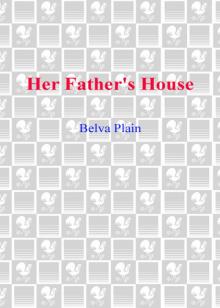 Her Father's House
Her Father's House Whispers
Whispers Crescent City
Crescent City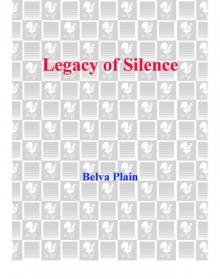 Legacy of Silence
Legacy of Silence Crossroads
Crossroads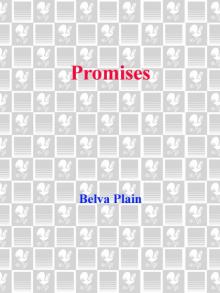 Promises
Promises After the Fire
After the Fire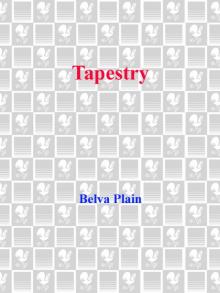 Tapestry
Tapestry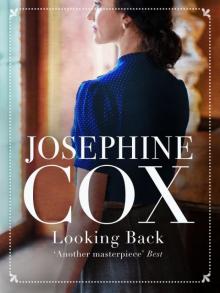 Looking Back
Looking Back Heartwood
Heartwood The Carousel
The Carousel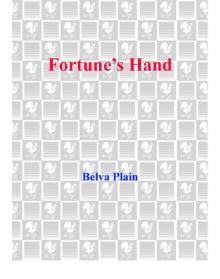 Fortune's Hand
Fortune's Hand Homecoming
Homecoming Random Winds
Random Winds Harvest
Harvest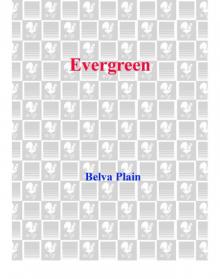 Evergreen
Evergreen Treasures
Treasures The Sight of the Stars
The Sight of the Stars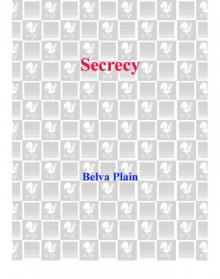 Secrecy
Secrecy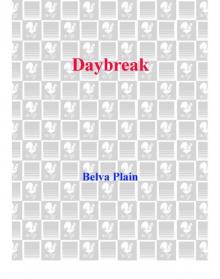 Daybreak
Daybreak Eden Burning
Eden Burning